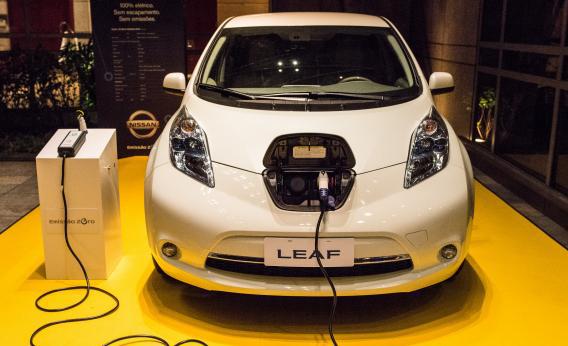With the power out in parts of the Midwest and the East for a fourth day, conservatives have noticed something alarming: Electric cars don’t work when there’s no electricity.
Turning the traditional “energy diversity” argument upside down, Hot Air’s Ed Morrissey suggests that gasoline-powered cars represent an important hedge against electrical outages, which can put subways and light rail lines out of commission:
Most internal-combustion vehicles can go 300 miles on a “full charge,” while their electric-only counterparts can only go one-tenth that distance. That’s usually enough of a range to get families to shelter where power exists to run air conditioning and provide food storage. … On the other hand, those who have no other transportation options except electric are stuck inside the emergency area.
I’m not sure where Morrissey is getting his numbers on how far an electric car will take you on a single charge. The Nissan Leaf’s range is estimated at 73 miles, not 30, and some versions of Tesla’s new Model S are advertised at 300 miles—about the same as a tank of gas.
Those quibbles aside, Morrissey has a point—sort of. He’s right that today’s electric cars won’t get you as far as gasoline-powered vehicles if the power goes out. And he’s right, in a very broad sense, that energy diversity is a good thing in case of emergencies.
But he ignores one obvious fact and overlooks another, less obvious one.
In arguing against an electric-car hegemony, he ignores the plain fact that plug-in electric cars make up less than one-tenth of 1 percent of today’s total U.S. market. Multiply that figure by 100 and you’ll have more energy diversity, not less.
Among those few households that already have an electric car, it’s a safe bet that most have a hybrid or gas-powered car as well. If Morrissey or anyone else can point me to a single, non-hypothetical household that has only electric vehicles and is now marooned in the outage area, I will gladly post an update here.
The less obvious point that Morrissey misses is that electric cars may have their own virtues in an electrical outage. Nissan has introduced a device in Japan that can actually turn the Leaf into a short-term backup power supply for your home. The Leaf reportedly stores enough power to supply an average Japanese home for about two days. While the average American home would surely drain the car a lot faster, electric vehicle owners could at least keep the lights on longer than their neighbors.
In that scenario, would the Leaf owners’ gloating become insufferable, leading them to be attacked by gas-can-wielding Ford F-150 partisans? I can’t wait for the next big power outage to find out.
